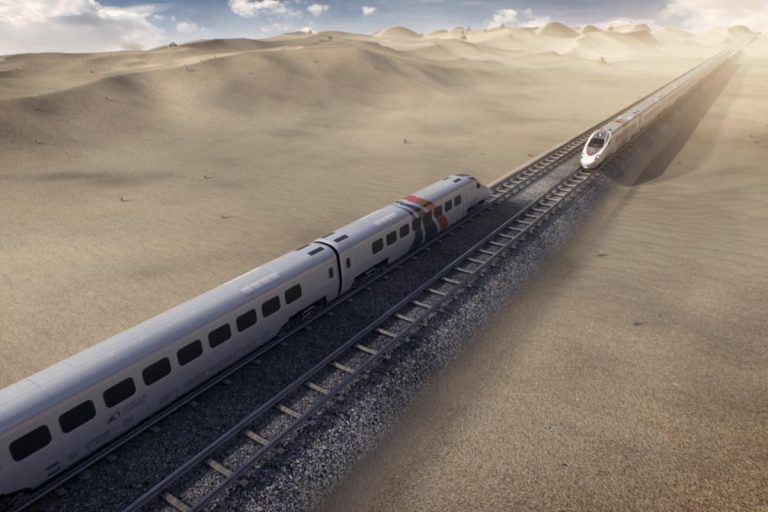Spain’s sustainable transport firm Construcciones y Auxiliar de Ferrocarriles (CAF) has signed a $326.7 million (AED 1.2 billion) deal to design, manufacture, supply, and maintain passenger trains for the UAE’s Etihad Rail project.
Each train will have a seating capacity of more than 400 passengers, and will run at speeds up to 200 kilometres per hour.
The trains, which will offer a variety of seating segments, will serve as a major addition to the public transport system in the UAE.
The agreement was signed by Shadi Malak, the chief executive officer of Etihad Rail, and Josu Imaz, the chief executive officer of the Rolling Stock of CAF.
Sheikh Theyab bin Mohamed bin Zayed Al Nahyan, the chairman of the Abu Dhabi Crown Prince’s Court and chairman of Etihad Rail; Suhail Mohamed Faraj Al Mazrouei, the UAE Minister of Energy; and Iñigo de Palacio, Ambassador of Spain to the UAE, were also present when the agreements were signed.
The development of the passenger railway services, one of the three strategic projects of the National Railways Programme, seeks to enhance the public transportation system in the UAE and improve living standards of the UAE’s citizens and residents.
The passenger trains will facilitate transport across the cities of the UAE, providing passengers with a quick, efficient, safe, comfortable, and cost-saving travel experience.
Through its partnership with CAF, a global leader in the railway industry, Etihad Rail will benefit from CAF’s long-standing experience for more than 100 years.
Etihad Rail passenger trains
The passenger train will connect 11 cities and regions in the UAE from Al Sila to Fujairah, including Al Ruwais, Al Mirfa, Dubai, Sharjah, Al Dhaid, and Abu Dhabi.
Passenger services will allow travellers to plan their journeys between the Emirates and cities of the UAE more efficiently, from booking their tickets until they reach their final destination.
They will reduce commute time by 30 percent to 40 percent compared to other modes of transport.
- Travelling from Abu Dhabi to Dubai, and from Dubai to Fujairah, will take only 50 minutes,
- Travelling from Abu Dhabi to Al Ruwais will take only an hour and 10 minutes,
- Travelling from Abu Dhabi to Fujairah will take only an hour and 40 minutes.
The passenger trains will be equipped with the latest cutting-edge technologies that suit the topography and climate of the UAE, which is key for ensuring high performance, efficiency, and reliability.
The trains will provide various amenities, entertainment, and comfortable seating at high levels of security, efficiency, and quality, allowing passengers to enjoy exceptional journeys.
The trains will be equipped with modern amenities, including infotainment systems, charging stations, and more, along with food and beverages, and ample legroom, in addition to an advanced air-conditioning system, to meet the needs of all citizens, residents, and visitors.
There will also be different seating segments, including first-class, business-class, and economy.
Global expertise and knowledge in passenger train services
Etihad Rail has recently signed three MoUs with Spain’s national railway operator Renfe, and the British companies High Speed 1 and GB Railfreight, to enhance cooperation and the exchange of knowledge, expertise, and the best practices in freight and passenger rail services and rail operations.
This took place during Middle East Rail 2022, which was hosted by the Etihad rail in May.
In February, Etihad Rail signed an agreement with First Abu Dhabi Bank (FAB) for financing the railway passenger transport services, with a total value of AED 1.99 billion as part of the UAE National Railways Programme.
First Abu Dhabi Bank will be the Certified Lead Arranger for the loan, as part of the agreement.
National Railway Network route
The National Rail Network’s route in the final package of Stage Two extends for 145 kilometres, connecting the borders of Dubai and Sharjah, going through Fujairah all the way to Ras Al Khaimah.
It comprises 54 bridges and 20 wildlife crossing points. It also has 9 tunnels which extend for 6.9 kilometres through Al Hajar Mountains, including the largest heavy freight railway tunnel in the Arab Gulf which runs for 1.8 kilometres.
The route is known for its distinct geographic location, being surrounded by mountains on all sides.
In November 2021, Etihad Rail completed the excavation works for all rail tunnels in this route, two months ahead of schedule and in compliance with the highest safety and sustainability standards.
This was achieved using the latest tunnelling equipment and the best modern technology, adding a notch to the project’s records in terms of safety.
Sustainability and reliability
The National Railway Network supports the growth of the national economy with sustainable transportation system, which provides safety and efficiency.
The network’s locomotives incorporate the latest technology for reducing emissions, where carbon emissions will be reduced by 70 percent to 80 percent compared to the amount emitted by trucks, with one single train journey replacing around 300 trucks on the road.
Etihad Rail employs the best global practices, and constantly conducts environmental impact assessments (EIAs) to limit the impact of the UAE National Rail Network on the environment during planning, construction, and operations.
Sheikh Theyab inspects UAE National Rail Network progress
Sheikh Theyab bin Mohamed bin Zayed Al Nahyan, the chairman of the Abu Dhabi Crown Prince’s Court and chairman of Etihad Rail, visited the final package of Stage Two of the UAE National Rail Network to review the progress of rail construction works in these emirates.
During the visit, which started in Al Suyoh area in Sharjah and concluded in Sakamkam, Sheikh Theyab inspected key landmarks on the project’s route in the final package of Stage Two of the network, including:
- The rail bridge in the Al Suyoh area in Sharjah
- The Al Bithnah bridge in the Al Bithnah area in Fujairah
- Tunnels and tracklaying works across the tunnels in the Al Hajar Mountains





